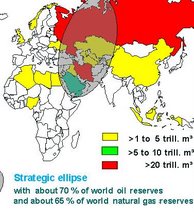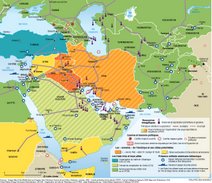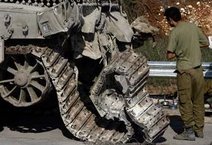
The Continuing Aims of Zionist Policies in the Middle East
Israel Shahak
Dr. Shahak is Professor of Chemistry at Hebrew University and
President of the Israeli League for Human and Civil Rights. He is a
survivor of the Bergen-Belsen concentration camp. The purpose of this
article is to investigate the real aims of Zionist policies in the
Middle East (not only or even chiefly in relation to the Palestinians)
and the inevitable consequences of the support, whether intentional or
not, by the United States of those aims over a long period of time.
The reason for using the expression "Zionist policies" in the title is
to draw the attention to the remarkable fact that the present Israeli
establishment continues to pursue with remarkable constancy policies
which began around 1917-22. Also, from that time up to the present,
there has been a remarkable continuity in the actual composition of
the ruling establishment. In spite of the many and frequent changes of
the government and of the ruling parties, the new wielders of power
have always been people who spent long years serving the previous
regimes in military or political capacities, and presumably accepting
the majority of their policies. This includes all of the more
important politicians of the Likud. Yitzhak Shamir was for sixteen
years in Mossad (Israel's Secret Service) under Ben Gurion and Levi
Eshkol; Ariel Sharon was a favorite of Ben Gurion. Menachem Begin, as
the head of the major opposition party, for many years was informed of
everything and in return gave his loyal support to most of the foreign
policies of Israel. Shimon Peres and Yitzhak Rabin played the same
game from 1977-84, even during the 1982 invasion of Lebanon. In fact,
with the exception of small groups on the right and the left margins
of the political spectrum, Israeli foreign policies, like the Zionist
policies before them, have been governed by a consensus (as it is
called in Israel) which has endured now for more than sixty years,
during which time the cohesion of this basic unity has very rarely
been shaken or even threatened. The Zionist establishment is in fact
the oldest in the Middle East, for its continuity has never been
broken, either by a revolution or by a large-scale influx of persons
with a different education or outlook from the founding fathers'.
During the same period, all Arab countries experienced one or both of
these disruptive phenomena.
This long continuity is one of the most important components of
Israeli strength. But the resulting inertia and reliance on old
precedents is also a source of weakness, particularly when new
policies or new approaches have to be devised. In particular, Israeli
policymakers will usually view the Arab world from a static point of
view and try to ignore the changes, particularly the social changes,
taking place in it.
As this analysis is concerned with long-term aims, I will ignore the
differences among "hawks" and "doves" within the Israeli
establishment. These are less significant than outsiders suppose and
are concerned mainly with means rather than ends. For example, many of
the Israeli establishment "doves" opposed Sharon in 1982 because they
were of the opinion that a much greater military effort should be
mounted against the Syrians, or that the alliance inside Lebanon
should not have been made with Phalangists, or not exclusively with
them. They were especially divided over how to represent the war to
the Israeli public or to world opinion. War itself was very little
opposed from inside the Israeli military establishment, although
everybody knew that it was coming. In a similar way in 1956, the
leftist opposition within the establishment opposed the Israeli
alliance with Britain and France but was of the opinion that Israel
should have attacked Egypt without them and changed the regime there.
In the same way, the Israeli attacks on Jordan in 1966-67 and the
attacks on the Syrian airforce over Damascus airspace ("in order to
change the Syrian regime" as Yitzhak Rabin, then the Chief of Staff,
proudly declared) which led to the six day war were supported by the
whole Israeli establishment. Of course, within this concensus there
are numerous pragmatic disagreements, but for the purpose of
discovering real long-term aims they can be ignored. Those aims can be
discovered first, from activities of the Israeli government; second,
from declarations obviously intended for the internal consumption of
the Israeli establishment itself; and third, from the rich historical
literature in Hebrew dealing with the history of the last sixty to
eighty years, some of which is on a very high level of veracity and
scholarship.
DOMINATION OF THE MIDDLE EAST
It is quite clear that the domination of the whole Middle East by
Israel is the constant aim of Israeli (and before this of Zionist)
policies and that this aim is shared (within the establishment) by
both "doves" and "hawks." The disagreement is about the means: whether
by war -- carried out by Israel alone or in alliance and on behalf of
stronger powers -- or by economic domination. This can best be shown
not so much by the case of the Palestinians, where the immediate
expropriation may obscure the wider thrust of policy, but in the cases
of Egypt, Syria and even Iraq. As early as the 1920s, all the
influence of the Zionist pressure-block in Britain was pitted against
the Egyptian National Movement, led then by Zaglul Pasha and the Wafd
Party. Both Chaim Weitzmann and Vladimir Jabotinsky opposed what they
called "British concessions" to Egyptians.
An important part of the argument about the long-term Zionist aims is
the fact that the opposition of Weitzmann, the supposed "dove," was
actually stronger and more adamant than that of Jabotinsky, who is
usually considered a hawk. Weitzmann opposed every Arab movement,
based -- as was inevitable and natural in the twenties -- on the
rising Arab middle class, and he did this by propagating among his
British friends a type of anti-Arab racism which can only be compared
to Nazi anti-Semitic outbursts. For exmaple, Weitzmann wrote to
Balfour on May 30, 1918:
The Arabs, who are superficially clever and quick-witted, worship one
thing and one thing only, power and success. . . . The British
authorities, . . . knowing as they do the treacherous nature of the
Arab, have to watch carefully and constantly that nothing should
happen which might give the Arabs the slightest grievance or ground of
complaint. In other words, the Arabs have to be "nursed," lest they
should stab the army in the back. The Arab, quick as he is to gauge
such a situation, tries to make the most of it. He screams as often as
he can, and blackmails as much as he can. . . . The fairer the English
regime tries to be, the more arrogant the Arab becomes.
(quoted from the original files of the British Foreign Office in
Publish It Not: the Middle East Cover-Up, by Mayhew and Adams,
Longman, 1975).
The Zionist, and later the Israeli, policies of opposition to every
step on the road to Egyptian independence, backed at least in private
by arguments of a similar type, continued to the point of formal
demands made by the newly created State of Israel to Britain not to
remove its troops in the early fifties from the canal zone. The
notorious "Lavon affair," in which an Israeli spy ring based on
members of the Jewish Egyptian community tried to put bombs in
Egyptian cinemas or in the American Library there, was similarly
intended to prevent the evacuation of the British troops from Egyptian
territory and to create the impression that the Egyptians are
terrorists, a theme which is still used about the whole Arab world.
Similarly, the aim of the 1956 Suez war from the Israeli point of view
was not only the destruction of the Egyptian army or the annexation of
Sinai, but the change of the Egyptian regime of that time. In fact,
Lova Eliav, then and now one of the leaders of the Israeli doves,
headed, by his own subsequent admission in 1972, a special task group
which was intended, in cooperation with the French government and
support from within the then-existing Jewish community of Cairo, to
carry out a coup d'etat and put into power politicians whom Israel
thought reliable. The plan was only prevented, to the great regret of
Israeli "doves," because it was made behind the back of the British
government of that time, which discovered it at the last moment and
vetoed it.
Through this whole long period from the twenties, the Zionist movement
and Israel were indeed in contact -- sometimes very intimate contact
-- with Egyptian politicians who were prepared to undertake policies
which would have entailed the continuation of Egyptian dependence on
outside powers and its separation from the rest of the Arab world as
the price of support for themselves. This aim was only achieved by
Begin's alliance with Sadat, which continued long-term tendencies,
with the United States being substituted for Britain and France. This
was made clear in 1977-1978 inside Israel, when the real compensation
for the Israeli withdrawal from Sinai was explained as being "the
drawing of a wedge between Egypt and the rest of the Arab world," and,
even more important, making Egypt completely dependent on yearly
financial support from the U.S. Congress, where Israel holds virtual
veto power, a sort of sword of Damocles over Egyptian policy.
One can say that the major difference between the so-called "doves" of
the Israeli establishment and the real radical opposition is with
regard to this policy. The establishment "doves" not only support it
but consider that it can be made into a permanent situation, while the
anti-establishment radicals understand that ultimately such policy is
self-defeating in terms of Egyptian society because it increasingly
alienates the Egyptian government which tries to carry it out. In
addition, the American aid, over which Israel has a veto power, must
be of such nature as to prevent any real development of Egyptian
economy or society, as has indeed happened.
A very good recent example of this constant attitude can be found in
the September 1985 issue of New Outlook, widely considered to be a
"peace journal," in an interview with Professor Shimon Shamir about
the Israeli achievements in Egypt made possible by the Camp David
agreement and the Israeli-Egyptian peace. In the opinion of Professor
Shamir, an Israeli Arabist with great influence on the government, one
of the Israeli achievements is that the Egyptian army is occupied now
with the construction of roads and buildings and even the baking of
bread. In other words, since it undergoes little military training, it
is a weak army. Can a state with a very weak army be called truly
independent? Can the majority of a people desire, or long tolerate, a
bread-baking army? We will return to a deeper consideration of these
questions after considering Zionist policies toward other Arab
countries.
An even better example is the now-revealed affair of Israeli relations
with the Syrian regime of Husni Zaim in 1949-50. That very unstable
and narrowly based regime wanted desperately to acquire American
support, and thought that it could do so by offering to "solve" the
Palestinian "problem" in the interest of Israel, by settling all the
Palestinian refugees in the Syrian territory beyond the Euphrates --
that is, as far away from Palestine as possible. The scheme was
vigorously pursued until the very moment when Husni Zaim was
assassinated. A high-level CIA dignitary was actually present in
Damascus at the time of the assassination to serve as a messenger from
the Israeli government, according to a report released from the
Israeli archives in accordance with the thirty-year rule of secrecy.
But the most illuminating part of that affair, as it affects present
Israeli policies, is the manner and the reason for its publication in
spring 1985. It was published in Al Hamishmar, the paper of the Mapam
Party (now formally in opposition, but really a part of the
establishment), as part of an argument against Ben Gurion, who did not
pursue, in the opinion of the "dovish" author, this scheme as fast as
he should and so missed the opportunity for peace. I am passing over
the Palestinian aspect of this scheme as being clear enough. But what
about the assumption of the Israeli "doves" about Syria or the rest of
the Arab world? It is obvious that any Syrian government which
attempted to carry out such a policy would have become alienated from
its own people, and thus completely dependent on the outside support
of Israel and the United States. Even with such support, of whatever
magnitude, it could not endure for long.
But for Israeli establishment "doves," this elementary point cannot be
grasped, even now. Israeli policy towards Syria can only be
comprehended if one understands the social fact that the whole Israeli
establishment, "doves" included, not only believes in making "deals"
-- such as the one described above -- with Arab regimes but also
disregards the certainty that regimes which consent to such deals will
become as alienated from their own people as the "Village Leagues" in
the West Bank or the "South Lebanese Army" are at present.
To cite a further example, in 1930-32 the Jewish community of Baghdad
was incited to oppose, openly and formally (but unsuccessfully) in
petitions to the British government and the League of Nations, the
change of status of Iraq from a mandate to a formally independent
country. The expulsion of Jews from Iraq in the early fifties is now
known, from reports released from Israeli archives, to have been
carried out with the full cooperation of Israeli agents who were
established in Baghdad at the time and who not only negotiated with
the Iraqi government and with the real ruler of the country, Nuri
Said, but actually boasted in a telegram sent to Tel Aviv that they
were "cooking more quickly" the law expelling the Jews from Iraq. The
"quick cooking" involved anti-Iraqi activities in the United States in
which American Jews took a prominent part. It seems that the Israeli
influence on Iraqi policies in the period before 1958 was quite deep
and extensive, and was probably one of the reasons for the fall of the
regime.
These are examples of activities which were not condemned within the
Israeli establishment when they were published in recent years,
despite the deep intervention in Lebanon. Many similar discussions
about proposals from the same period made both by "doves" and "hawks"
could be quoted to illustrate the thesis that the domination of the
whole Middle East, either by a warlike conquest of parts of it or by
alliances with regimes which necessarily become alienated because of
such alliances, or by making those regimes dependent on an internal
power structure over which Israel (or the Zionist movement) has a
great influence, has been and remains the real Israeli aim. In
pursuing this aim the Israeli establishment has shown both flexibility
and tenacity in the methods employed, and also in being ready to make
significant retreats when under compulsion.
There are two principal examples of such retreats: the retreat from
Sinai from 1956-57, made because of the insistence of the two
superpowers, and the retreat from most of the area of South Lebanon,
made under the pressure of popular resistance. The lesson of 1956-57
has been absorbed by the Israeli establishment. All possible efforts
have been made (and will be made) to prevent any cooperation between
the United States and the USSR on Middle Eastern affairs, with great
prospect of success in that direction. The lesson of guerrilla warfare
based on popular support in Lebanon in 1983-85 has not been absorbed
in Israel. In fact, the profound social change which has occurred in
most Arab countries since the fifties is not understood. The inertia
resulting from long continuity produces the effect that the only
"model" of an Arab regime (or movement) which the Israeli
establishment -- the "doves" particularly -- assumes and wants, are
such as were only too prevalent from the twenties to the fifties, and
whose most characteristic feature was dependency on outside powers
combined with alienation at home. Sadat of the last few months of his
life fit the model perfectly.
JUSTIFYING "PREVENTIVE" WARS
The invasion of Lebanon in 1982 and the subsequent Israeli opposition
to that war have created in some circles outside Israel a false
picture of a change within the Israeli establishment which did not
happen. Since I am describing here the mainstream of Israeli opinion,
I will ignore the radical opposition to the war to concentrate on one
aspect of the debate within the establishment. Sharon and his henchmen
were accused, time and again, of deceiving the Israeli government and
the public as to the extent and the firepower of the PLO armed forces
and the Syrian units in Lebanon. Sharon claimed that they were huge
and so had to be destroyed because the very existence of such a
military force is a "reason" for an Israeli attack. His establishment
opponents, who were factually correct, said that the PLO and Syrian
armed forces in Lebanon were small. Both sides actually shared the
same assumption, which dates from the early fifties, that the very
existence of an Arab state with a military force, beyond certain
debatable qualitative and quantitative bounds, is a "reason" for an
Israeli preventive attack on it. Consideration of parity between
Israel and the other state is out of the question.
It is extremely important to understand that this fixed policy is now
propagated with full force as the reason" for the next Israeli
preventive war. There has been a whole series of very serious
predictions from the highest military sources (from October 1984) that
war with Syria is "inevitable." On June 10, 1985, Tali Zelinger, the
military correspondent of Davar, announced in the name of the
"security apparatus" (the army together with the various intelligence
systems) that "the evaluation today is that sooner or later a war
between Syria and Israel will break out." Even more open was Ran
Edelist, the military correspondent of Monitin, the most prestigious
Hebrew monthly, in the August 1985 issue (which appears at the end of
July). To explain better what he did and how the Israeli establishment
can find ways to circumvent censorship in order to show to its members
which way the wind is blowing, it is necessary to explain that
subtitles of articles in the Hebrew press do not have to pass the
censor but are added by the author or the editor at the last moment.
Ran Edelist, who enjoys the best contacts with Israeli generals,
interviewed first a colonel in the reserves, Haim Yaabetz, who has
just retired from long and distinguished service in military
intelligence which included in its last years strong support for the
"strategic megalomania of Arik Sharon." He then added to the
interview, which proceeded along the usual lines of the inevitability
of war (not only with Syria, but as a permanent characteristic of
Israeli existence in the Middle East) the following subtitle quite
unconnected with the text:
Division commander in the North, D., ordered his officers to make
known to all soldiers of this division that the war with Syria is very
near, and I, a red-haired brigade commander, told all comrades: ‘This
is what is going to be, this is what exists, so let us fall to work'.
The author then discusses in considerable detail "the price" in number
of victims that Israel is going to pay for its future victory over
Syria. I emphasize that such announcements, especially those made to
officers by division or brigade commanders in Israel, are to be
regarded very seriously, since it is by such means that the real
decision makers in Israel (who are not the government, which is
informed at the last moment) communicate their decisions to the most
important part of the Israeli establishment. The real decisions to
attack Egypt (in 1956) or to invade Lebanon (in 1982) were
communicated in exactly the same way. In 1967 although Nasser's steps
hastened the process, the officers knew that Israel was going to
attack weeks before it happened, while the majority of the Israeli
government fondly imagined that war could yet be averted.
Of even greater importance are the clear signs in the Hebrew press and
other Israeli sources which predict an Israeli attack on Jordan.
Again, if we will free our minds of cant and of the influence of
Israeli official propaganda and take a hard look at Israeli actions
through the years, we will see that the actual type of an Arab regime
(monarchical or republican, "right" or "left") is of no importance to
Israel. What is important is whether it is strong or weak militarily
and otherwise, and whether it enjoys a measure of popularity with its
subjects. A Middle Eastern Arab state which is developing military
strength is going to be attacked for this very reason (when the
conditions are favorable), and those interested in Middle Eastern
politics should accept this high probability as a fact of life, until
it is altered by a basic change within the Israeli Jewish society. Let
me quote rather extensively from the Hebrew press, which, as usual,
explains this in advance to its readers. Reuven Padahtzur, the
correspondent of Haaretz on military affairs and one of the most
serious and better informed writers on that subject in Israel, writes
under the title "Who Wants a Preventive Blow?" (Haaretz, July 4,
1985):
Supplying the Jordanian army with advanced fighter planes and mobile
land-air missiles might force Israel to react with a preventive blow
in the case of a war breaking out in the region. The American-
Jordanian arms deal must be considered not only from the relatively
narrow viewpoint of direct military risks emanating from the supply of
modern, sophisticated weapons to the Jordanian army. One of the
interesting, dangerous and undesirable repercussions of this
transaction is the almost total limitation of the variety of military
options that the Israeli Defense Army will have. The introduction of
advanced fighter planes and of mobile land-air missile batteries into
Hussein's army might force Israel to react in advance with a
preventive blow against this army, in every case of war breaking out
in the region.
After giving in great detail the military equipment which Jordan has,
or is going to purchase mainly from the United States but also from
the USSR, and after highlighting the great danger to Israel from the
"joint maneuvers by the Jordanian and American forces," since those
exercises are an important contribution to the improvement of the
offensive capacity of the Jordanian army, the author concludes:
Israel's security policy must have an answer also for the worst
scenario. One of these scenarios, taking into account a situation when
Israel has to face the outbreak of war on the eastern front, including
the armies of Syria, Jordan, as well as Iraqi expeditionary
contingents, forces the Israeli Defense Army to take immediate steps
in order to neutralize the threat to sensitive targets inside Israel.
For this purpose it seems that there will be no choice but to inflict
a preconceived preventive blow on Jordan.
Thus, paradoxically, the supply of modern sophisticated weapons to the
Jordanian army not only does not enhance the security of the Kingdom
of Jordan, but even involves a great danger to its army (my emphasis).
The same theme was taken (among many others) by the famous Zeev
Schiff, also in Haaretz (August 16, 1985) in an article entitled "Who
Wants to Finish Off Hussein?" After pointing out that the old, well-
known plan of Sharon for what he calls "a Palestinization of
Jordan," (which means an Israeli conquest of Jordan and an
establishment of a "Palestinian" regime there of the "Village League"
variety) has also been supported for many years by some Israeli
leaders of the Labor Party, he describes the ways in which a "case"
for such a step will be built in Israeli public opinion (and a part of
American opinion as well, one may add):
One does not begin with sudden (airforce) bombardments in the center
of Amman. Also in Lebanon it did not begin with the invasion itself
and the military advance on Beirut. Before this, "the case" should be
built, the threat should be cultivated, until it becomes something
insupportable as a threat to existence, in the eyes of (Israeli)
public opinion (my emphasis).
He even hints at further very interesting possibilities: After
pointing out that "the modern history of the Middle East is full of
examples of removing a ruler by means of murder" and that King Hussein
was a target for such attempts in the past, he sagely observes that in
the past, "those who indulged in such machinations were always Arabs,
but it should not be so in the future. Different scenarios are
possible in such a situation. If someday the responsibility for the
Israeli Intelligence and Security Services falls into the hands of a
person without restraint, everything is possible" (my emphasis). As we
say in Hebrew, a hint to the wise is enough, and here we have much
more than a hint; we have a full scenario which is not dependent,
except in timing and outward presentation, on Sharon becoming once
more the power inside the Israeli government, but on the same basic
reasons which have ruled Israeli (and before this the Zionist)
policies for a long time. Incidentally, Schiff quickly adduces as the
"reason" which worries Sharon and pushes him to advocate an Israeli
"preventive" attack on Jordan, "that a part of the PLO is becoming
more moderate." In this there is also nothing new; the careful
observation of the cease-fire by the PLO between August 1981 and June
1982 was one of the reasons, freely admitted inside Israel, why Israel
invaded Lebanon. This is part of a familiar pattern.
I will only briefly mention the "reasons" which are being given to the
more gullible parts of public opinion, especially in the United
States, for such scenarios: "The fight against terror," particularly
world terror, is one of the most important of them, and of course
protecting "Western civilization," as has been said countless times in
the past. Here, too, nothing changes. Indeed the main point of this
article is that the policies of the Zionist and Israeli establishment
are, so far, constant, and therefore an unprejudiced analysis of the
past can be a guide to the contingencies of the future.
This analysis can be confirmed by an examination of the official
"reasons" put forth inside Israel for the present "missile conflict"
with Syria. Briefly, Israel claims for itself the right to dictate
where, on its own territory, Syria will or will not station weapons
(even such defensive weapons as anti-aircraft missiles). It is
important to perceive that all public opinion in Israel, except the
opposition from the left to the present National Unity government
(about 13 percent of the political strength as expressed by Knesset
seats), is united on this point. The whole debate, as freely expressed
in the Hebrew press (not in the Jerusalem Post, of course), is whether
Israel should first take the diplomatic road and only afterward attack
Syria, or attack without diplomacy at a time of its own convenience.
The principle of domination -- that Israel can unilaterally dictate to
an independent state about defensive weapons on its own territory --
is accepted by a great majority of the Israeli public, including,
contrary to the myths propagated among both the Western and the Arab
publics, the "Peace Now" movement. Nor is this the first demand of its
kind. On the contrary, like the political demands discussed above, the
demand that the Arabs disarm or limit their armaments goes back to
1918-20, and continues throughout Zionist history. To limit discussion
only to the last few years: 1) the overflights of the Saudi bases like
Tabuk, which reinforced the Israeli demand that Saudi planes or other
equipment should not be based there, and 2) the demands to limit the
sales of sophisticated defensive weapons to Jordan and countless
others are of exactly the same kind and illustrate the same principle
of domination of the whole Middle East which not only Israeli
governments (and before them the Zionist leadership) but the great
majority of the Israeli public support as a principle of such
overwhelming importance that it justifies waging a war.
It is even more important to perceive that the United States now, like
Britain and France before it, agrees in principle to those
imperialistic Israeli policies and only tries to soften them in their
practical application. American diplomats carried the Israelis'
demands (which by any standard, whether that of international law or
the principle of self-determination, were outrageous) to Syria in the
winter of 1985-86, as they carried similar demands to Saudi Arabia
before. The American government and an overwhelming part of public
opinion, as expressed in the media, accept without discussion the
"principle" that Israel can dictate through the United States to Arab
states, but not of course the reverse. It is acceptable to the
American Congress that a discussion of national dimensions should be
held about whether AWACS planes in Saudi Arabia are a danger to
Israel, but there is no record of any discussion in the Congress over
whether any of the many types of offensive weapons delivered to Israel
by the United States is a danger to any or all Arab states.
Of course, such "principles" are used, and have been used through the
ages, in relations between the superpowers and weaker states. But the
extraordinary and exceptional case of Zionism and Israel consists
exactly in this: that Israel by itself does not have the strength to
be a superpower dominating the Middle East, even through military
conquest. It employs to a great extent the strength of others, relying
on internal manipulation of the public opinion of the really strong
powers. This fact, however obscured in the Western media and unclear
(I think) to a great part of the pro-Western Arab establishments, is
quite clear to the Arab peoples. The diplomats can be, perforce,
satisfied with humiliating arrangements which achieve some small
measure of practical success, i.e. the Israeli flights over Saudi
territory cease after a time, or after a great dispute some old
Hercules planes are delivered by the United States to Egypt. But the
people, particularly the educated people, who are interested in
politics and determine it in the long run, feel the humiliating
principle involved and become -- indeed must become -- more and more
alienated from their pro-American regimes and also more anti-American.
As I have tried to show, this has also been one of the constant aims
of Zionist and Israeli policies. The effect of these popular pressures
in Arab countries, whether expressed in demonstrations and protests or
in individual acts of indiscriminate terror which have a measure of
popular support, is the same. I am not discussing here acts which I
condemn on moral grounds, but rather their social and political causes
and effects. A vicious circle is created in which precisely those
basic discriminatory anti-Arab principles of American policy are being
reinforced, and they in turn reinforce the alienation of the Arab
peoples from all pro-American regimes. No merely diplomatic solution
of any kind, no "peace process" can break this vicious circle so long
as the principles which the United States inherited from Britain and
France and which are constant in Zionist and Israeli policies, remain
unchanged and undiscussed. The present course of affairs will lead
necessarily to either another "ordinary" war or to a much bigger
conflict of catastrophic dimensions.
One relatively recent example of American policy in the Middle East
can illustrate the basic principles involved and their perception by
all the peoples of the Middle East (Jews as well as Arabs, only in a
contrary sense). I refer to the affair of the American intervention in
Sudan to help (by corruption, bribery and undue influence) the Falasha
Ethiopian Jews to come to Israel, where many of them were settled in
the West Bank despite some feeble official American protests, which
were treated by Israel with justified contempt. The facts are clear
enough, although widely disregarded by the American media: Sudan and
Ethiopia are full of starving refugees numbering many millions. In the
midst of this general human misery, an enormous American effort both
in money and politics, involving the Vice President of the United
States, was spent on helping a small group of people whose sole
criterion was that they were recognized as being Jews by the Jewish
State.
Politically, this effort was one of the main causes, perhaps the most
important immediate cause, of the fall of the Numeiri regime. The
trials, now continuing, of the highest Sudanese officials, followed by
all Middle East people with great interest, reveal to all of them the
fundamental principle of American (and of course Israeli) policy in
the Middle East: racist discrimination. Human suffering by itself does
not count; the most important, almost the only, criterion is to what
group of people the human being belongs. If he belongs to the group
considered superior (in a similar way to the superiority, assumed
fifty years ago about the "Aryans") then all the effort of the United
States will be spent on his behalf, even to the extent of harming the
immediate pragmatic interests of the United States. But if he belongs
to the millions of "inferior" people, to which all non-Jews of the
Middle East belong according to accepted principles of American
politics, then very little is owed to his human suffering and nothing
to his human dignity. The word "fanaticism" is very often on American
and Israeli lips where Arabs are concerned, but it should be
recognized that the Zionist and Israeli principles of policy with
regard to the Arab peoples of the Middle East are fanatical, both in
their total disregard for reason and social facts, and in their
application, which continuously defies most considerations of
political interest or "Realpolitik." Without this necessary
recognition of the blind fanaticism involved in the real Zionist and
Israeli policies and in the acceptance and internationalization of
this fanatical approach by the American establishment, no
understanding of the actual course of politics in the Middle East is
possible. With the acceptance of this as the main explanatory factor,
the actual course of affairs can be understood, both the past and as
far as possible the future as well.
APPENDIX: ON THE NECESSITY OF KNOWLEDGE, WHICH IS ALSO POLITICAL POWER
Professor Edward Said, in his most important work, Orientalism, has
pointed out how the mainstream of the Western "Orientalist" research
served, consciously or unconsciously, the aim of domination of the
Arab world by the Western powers. However, one should add to his
analysis one important factor: Orientalism was indeed a powerful
instrument of penetration and conquest because it contained useful
facts, however maliciously arranged, and also because the Arab world
was almost completely ignorant about the West. A corresponding
situation exists now: Israel and "Israeli friends" in the West are
well-informed about the Arab world, at least factually, even though
that information is usually arranged in the interest of Israeli
domination. On the other hand, an almost complete ignorance about
Israel prevails, as can be deduced from the fact that a serious and
comprehensive survey of the Hebrew press does not exist outside
Israel, certainly not in the Arab world. (Incidentally, one can say
that the ignorance of Palestinians, except those living in Israel,
about Israeli affairs is as great as that of the other Arab peoples).
Although, as has been implied above, this does not prevent these
peoples from perceiving the basic truth and from acting accordingly
after a period of time, it prevents the average Arab intellectual and
also the small minority of Western people who do not accept anti-Arab
fanaticism from analyzing the situation before it is too late. As
Francis Bacon said, knowledge is power; this applies also to political
knowledge. The accurate, factual and ideological knowledge of Zionism
and of Israeli society and politics is the most important single
condition for breaking the vicious circle of the attempted Zionist
domination of the Middle East. This domination is ultimately doomed to
failure, but in the absence of knowledge this failure will cost much
more in blood and human suffering than otherwise.






























